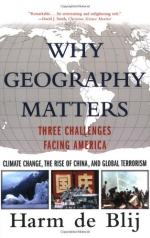
|
| Name: _________________________ | Period: ___________________ |
This test consists of 15 multiple choice questions and 5 short answer questions.
Multiple Choice Questions
1. What does de Blij think may eventually happen to the European Union?
(a) It may become a superpower that challenges U.S. dominance.
(b) It may collapse into disorder and economic chaos.
(c) It will become a hub for terrorism and will become a troubled region.
(d) It will become overwhelmed by foreign debt and domestic taxes.
2. Which of the following was the only other country to recognize Chechnya as independent in 1999?
(a) The United States.
(b) Turkey.
(c) Afghanistan.
(d) Saudi Arabia.
3. What three groups fought over China in the early 20th century?
(a) Mongols, Koreans, and the Vietnamese.
(b) Nationalists, Communists, and the Japanese.
(c) Northerners, Southerners, and guerilla revolutionaries.
(d) Corporations, human rights agencies, and the United Nations.
4. How does de Blij think that the U.S. should react to terrorist attacks on airplanes?
(a) Stop allowing people from other countries to enter the United States.
(b) Require all American passengers to carry passports with them at all times.
(c) Ground all planes and institute stricter security measures after each attack.
(d) Resume normal operations as quickly as possible after an attack.
5. Why were many Americans shocked when Nixon went to China?
(a) Because China was a Communist country.
(b) Because China had a terrible human rights record.
(c) Because China was a dangerous place to visit.
(d) Because China was not a Christian country.
6. What was the Marshall Plan?
(a) A plan for connecting all of Europe as one big country.
(b) A plan for defeating communism in Eastern Europe.
(c) A plan for Western European countries to be rebuilt with U.S. aid.
(d) A plan for European countries to agree never to go to war again.
7. What is a fatwa?
(a) A proclamation dictating how Muslims should live.
(b) An extremist Islamic school.
(c) A holy war.
(d) A religious pilgrimmage.
8. What is Afghanistan like today?
(a) It is a modern Islamic country.
(b) It lacks most modern amenities.
(c) It has become a satellite of Communist Russia.
(d) It has a thriving agriculturally-based economy.
9. What did H.J. Mackinder argue in what de Blij calls the "most often cited article in geography"?
(a) That the next superpower would have nuclear weapons.
(b) That the next superpower would be a Eurasian land-based country.
(c) That the next superpower would be the United States.
(d) That the next superpower would be from east Asia.
10. Why did many observers argue that Turkey should be allowed to join the European Union?
(a) Because Turkey will become an economic superpower in the next century.
(b) Because it would improve understanding between the Christian and Muslim worlds.
(c) Because Europe's influence would discourage terrorist activity in Turkey.
(d) Because Turkey is geographically part of Europe and Asia.
11. Who is Muhammad ibn Abd al-Wahhab?
(a) The founder of Islam.
(b) The leader of a terrorist movement targeting Americans.
(c) A conservative, extremist Muslim theologian.
(d) The leader of the Iranian government.
12. In which of the following countries are Muslims and Christians at war with each other?
(a) Sudan.
(b) Morocco.
(c) South Africa.
(d) Egypt.
13. Which of the following cities is a popular haven for terrorists?
(a) Mexico City.
(b) Paris.
(c) Cairo.
(d) New York.
14. What is Russia's connection with the European Union?
(a) Russia was once, but no longer is, part of the European Union.
(b) Russia is likely to be accepted into the European Union.
(c) Russia is not being considered for admission to the European Union.
(d) Russia was invited, but has refused to join, the European Union.
15. What event became known in China as the "Great Leap Forward"?
(a) The campaign against Confucianism.
(b) Collectivization of farms.
(c) The invasion of Tibet.
(d) Implementation of the one family, one child policy.
Short Answer Questions
1. How does de Blij characterize sub-Saharan Africa?
2. What are China's current territorial claims based on?
3. Why is sub-Saharan Africa so isolated?
4. How do subsidizing American farmers hurt Africans?
5. What country did Afghan refugees flee to when the Soviet Union withdrew from Afghanistan?
|
This section contains 765 words (approx. 3 pages at 300 words per page) |

|




